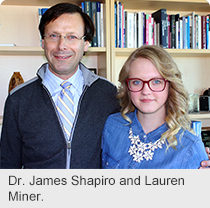
February 18, 2014
EDMONTON – A Medicine Hat girl has entered her teenage years healthy, active and pain-free two years after becoming the youngest patient in Canada to undergo a groundbreaking procedure in Edmonton to cure a debilitating disease.
Lauren Miner was diagnosed in 2006 with a rare form of hereditary pancreatitis, a disease that causes the pancreas to digest itself, leading to chronic and debilitating pain, and a 50 per cent chance of developing pancreatic cancer. Today, the 13-year-old is a straight-A student and a competitive swimmer who trains two hours a day, six days a week.
“Life is easier. Food tastes good. Having no pain is actually possible,” says Lauren.
Her improved quality of life is the result of a leading-edge surgical procedure, called an auto islet cell transplant, pioneered in the city. Local surgeons removed Lauren’s pancreas and isolated islets, the parts of the pancreas that produce insulin, and introduced the islets into her liver. The transplanted islets continue to produce insulin, keeping the patient’s blood sugar under control.
“We never take removing someone’s pancreas lightly, especially in pediatric cases, but when I saw Lauren I felt she would be a good candidate for a total pancreatectomy with auto islet cell transplant,” says Dr. James Shapiro, UAlberta Professor of Surgery and Medicine, and Director of the Clinical Islet Transplant Program.
“She was an otherwise healthy girl but the combination of hereditary pancreatitis along with a rare genetic mutation in her genes was very concerning.”
Lauren had more than two dozen extended hospital stays in the six years following the diagnosis.
“We were told to take her to Disneyland and help her to enjoy what she can,” says Lauren’s mother, Stacey. “In that time, she rarely had a day without pain but thankfully we had a tough little girl who wasn’t willing to give up.”
While hospitalized in Medicine Hat following an attack in fall 2011, Stacey asked physicians to reach out to Dr. Shapiro about treatment options for Lauren. A handful of centres around the world were performing auto islet cell transplants on patients with pancreatitis, including Edmonton’s Clinical Islet Cell Transplant Program.
For an auto islet cell transplant to go ahead, the isolation lab must isolate a minimum of 2,000 cells per kilogram of the patient’s weight. In Lauren’s case, the team isolated 8,634 cells per kilo, resulting in a successful transplant that gives her excellent blood sugar control.
“Thanks to the islet isolation lab led by Dr. Tatsuya Kin and Doug O’Gorman, we had the unique ability here in Edmonton to extract the islet cells from Lauren’s diseased pancreas and could give her back her own purified islets,” says Dr. Shapiro. “The isolation team work day and night and have a skill set here that is unsurpassed by any other program.”
Adds Stacey: “We are so grateful this surgery and procedure was available in Alberta. She still has to take enzymes but she no longer has chronic pain or has to take heavy doses of opioids to manage the pain. Her quality of life now is incredible.”
Lauren’s health care experience has inspired her to become a pediatric anesthesiologist so she can help other children get relief from pain.
More than 400 islet transplants have been performed in Edmonton since 2000 – more than any other centre in the world. The first successful auto islet cell transplant in Canada was performed in Edmonton in 2002; to date, 26 adult and four pediatric auto islet cell transplants have been performed at the University of Alberta Hospital.
Edmonton is the only site in Canada performing pediatric auto islet cell transplants.
The Clinical Islet Transplant Program is supported by Alberta Health Services, the Government of Alberta, the University of Alberta, and University Hospital Foundation (UHF). Generous donors, including C.F. & Gladys MacLachlan, began supporting the islet cell transplant program at the University of Alberta Hospital in 1990. This early investment provided the funding this groundbreaking program required to conduct research and develop best practices that are now saving and changing lives in Edmonton. In total, the UHF has directed over $400,000 to advance the islet cell transplant program.
Physicians and patients interested in learning more about the Clinical Islet Transplant Program in Edmonton are encouraged to visit http://www.islet.ca or call 780-407-1501.
Alberta Health Services is the provincial health authority responsible for planning and delivering health supports and services for more than four million adults and children living in Alberta. Its mission is to provide a patient-focused, quality health system that is accessible and sustainable for all Albertans.